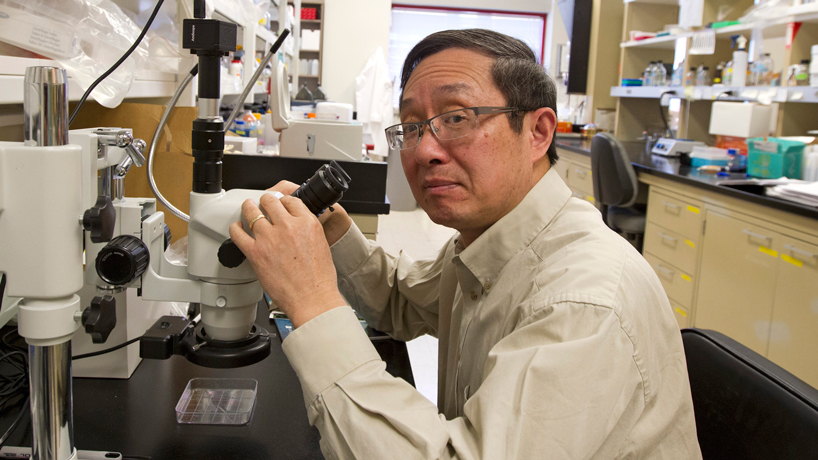
UMSL biologist Xuemin (Sam) Wang has earned the 2014 Chancellor’s Award for Excellence in Research and Creativity. (Photos by August Jennewein)
For his groundbreaking research in plant biology, Xuemin (Sam) Wang, has earned the 2014 Chancellor’s Award for Excellence in Research and Creativity.
Wang joined the Department of Biology at the University of Missouri–St. Louis in 2004. He holds a joint appointment as the E. Desmond Lee Professor of Plant Sciences, and as a member of the Donald Danforth Plant Science Center in Creve Coeur, Mo. He will receive a plaque and a $1,000 honorarium at the Chancellor’s State of the University Address on Sept. 17.
Wang and his collaborators have made seminal discoveries in cell signaling and identified new genes, pathways and mechanisms to increase oil production in plants. One of their technologies was exclusively optioned to an international seed company in fiscal year 2013.
While he’s honored to be singled out for the chancellor’s award, he’s quick to point out that his research is a team effort.
“This is a recognition of excellent work performed by my many past and present graduate students, postdoctoral scientists and undergraduate students that I have had the privilege to work with,” he said. “I appreciate all the support from my colleagues and the administration, which has made our hard work and pursuit of knowledge enjoyable.”
Wang is an internationally renowned expert in plant phospholipases and lipid-mediated signaling. Plant lipids are an incredible source of nutrition for animals, but they are also critical players in the quest for alternative energy sources.
“Sam’s work on membrane lipid-based signal transduction has been pathbreaking, and he continues to make seminal contributions in the new area of phospholipase-mediated signaling,” said Patricia Parker, the E. Desmond Lee Professor in Zoological Studies and chair of the Department of Biology at UMSL. “I think it is probably true that he has the best funding record of any researcher at UMSL, and we are proud that he is in biology.”
Wang holds several U.S. patents. He has a superior record of productivity, including more than 135 publications in top-tier journals such as Science, Nature Biotechnology and Proceedings of the National Academy of Sciences. His research has been supported by multiple federal agencies including the National Science Foundation and U.S. Departments of Agriculture, Energy and Transportation.
In addition to his research, Wang is equally as effective in his teaching and service contributions. Through his research programs, he has trained multiple PhD students and postdoctoral students. He has also played leadership roles in organizing twelve international meetings on plant lipids and biology.
Wang graduated from Huazhong Agricultural University in Wuhan, China, with a bachelor’s degree in crop science, followed by a master’s degree in genetics from Ohio State University in Columbus. He earned his doctorate degree from the University of Kentucky in Lexington.















